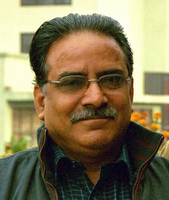KATMANDU, Nepal -- Nepal's ruling coalition inked a compromise deal with the opposition Maoists to extend the term of the Constituent Assembly (CA), which also functions as the interim Parliament, on the verge of its expiration on Friday. While the standoff was prolonged by a narrow power struggle between the two blocs, observers can take comfort in the fact that both sides ultimately heeded the popular mood demanding stability.
The CA was elected in 2008 and mandated to write a new constitution to finalize the country's transition from a theocratic monarchy to a secular democracy. Its tenure was due to end at midnight on May 28. However, the opposition Unified Communist Party of Nepal (Maoist), led by Pushpa Kamal Dahal (popularly known as Prachanda), was not willing to support the government's proposal to extend the parliament's term unless Prime Minister Madhav Kumar Nepal stepped down.
The Maoists, who won the 2008 elections, have been attempting to return to power ever since their government fell in 2009 over a disagreement with the president over the integration of former guerrillas into the national army. Their support was indispensable for the CA's extension, given that they control close to 40 percent of the 601-member parliament.

